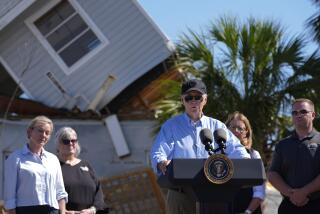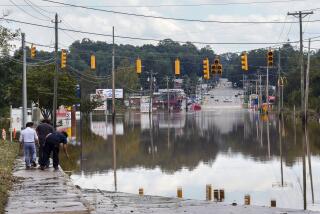Bush Returns to the Gulf Coast, Puts Good Face on Its Recovery
BAY ST. LOUIS, Miss. — Thousands remain homeless and destruction still dots the landscape, but President Bush on Thursday lauded “pretty dramatic” progress on the Gulf Coast since Hurricane Katrina devastated the region in late August.
In his first visit to the area in three months, Bush met with business owners and local officials in New Orleans, surveyed rebuilding efforts along the coast from a helicopter and addressed storm survivors and officials in this severely damaged Mississippi beach community.
Although he offered no new programs, he sought to convince residents that billions in federal aid was making a difference -- and that billions more was on the way.
“It’s hard sometimes, unless you’ve got a perspective,” said Bush, who has visited the area nine times since Katrina struck Aug. 29. “I have the perspective of having spent some time here, but not all my time. And I can remember what was, and now what is, and I can see what’s going to be too. And it’s going to be a better Gulf Coast of Mississippi.”
The president used similarly optimistic words during his brief stop in New Orleans, encouraging tourists and conventioneers to visit the still-devastated city.
“The contrast between when I was last here and today ... is pretty dramatic,” he said. “New Orleans is reminding me of the city I used to come to visit.
“It’s a heck of a place to bring your family. It’s a great place to find some of the greatest food in the world and some wonderful fun. And I’m glad you got your infrastructure back on its feet.”
But Bush’s optimism was tempered by doses of reality. In Mississippi, he spoke in a high school gymnasium surrounded by collapsed homes, newly vacant lots and pile after pile of rubble.
And in New Orleans, Bush arrived in the midst of a controversy over a reconstruction proposal in which the most severely damaged areas -- where many African American residents lived -- would have to justify the reasons for rebuilding them. Local politicians and residents have greeted the plan with outrage, decrying proposals to abandon some neighborhoods while spending billions on a rail link to Baton Rouge and the Mississippi coast.
The plan requires approval by local officials and the White House, but administration officials declined Thursday to take a firm position.
“We’re not going to weigh in. It will be their plan,” said Donald Powell, the administration point man on hurricane recovery, echoing a refrain by Bush that local leaders, not the federal government, should be taking the lead in rebuilding efforts.
During his meeting with several small-business owners, politicians and other community leaders, Bush hailed his administration’s commitment to spend $3.1 billion on rebuilding and strengthening the levees. They are considered the linchpin to rebuilding New Orleans, allowing the city to exist below sea level and avoid another catastrophic flood should a storm strike again. He emphasized that the federal government had authorized $85 billion for rebuilding the Gulf Coast overall, and that $25 billion was already being spent.
But the White House has come under fire for failing to commit to building a more expensive levee system that could guard against the strongest possible hurricane, a Category 5 level storm. The new levees would protect against an estimated Category 2 or 3.
Katrina, which reached Category 5 as it traveled over water, weakened to a Category 3 before striking the Gulf Coast, according to the final National Weather Service report on the storm.
An editorial in the Times-Picayune published the day before Bush’s visit, headlined “Mr. President, we need you,” pleaded with the White House to back levees that could guard against a Category 5 hurricane. The editorial said Bush would find a city in the “throes of recovery” -- but full of worry as well.
“They worry that the White House isn’t committed to protecting the region from the fiercest hurricanes,” the newspaper said. “They worry about whether their neighborhoods will be safe in the long run. They worry about whether they -- and their neighbors -- can afford to rebuild.”
Bush, though, was not deterred from his positive approach, promising that New Orleans would end up a “better city” and forecasting a “building boom” in Mississippi. He said he noticed an extra “bounce in people’s step” along the Gulf Coast.
Then the president left the region for Palm Beach, Fla., where he attended a reception at the oceanfront mansion of home builder Dwight Schar. The event was expected to raise about $4 million for the Republican National Committee and a group for GOP Senate and congressional campaigns.
Times staff writer Joel Havemann in Washington contributed to this report.
More to Read
Sign up for Essential California
The most important California stories and recommendations in your inbox every morning.
You may occasionally receive promotional content from the Los Angeles Times.










